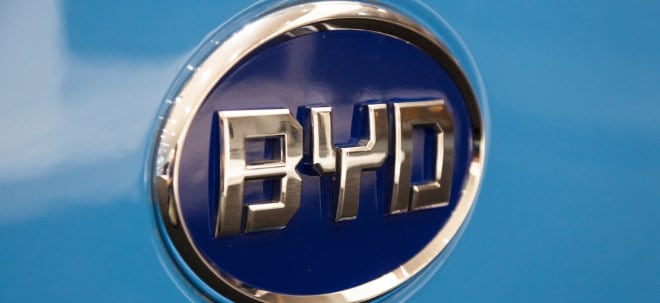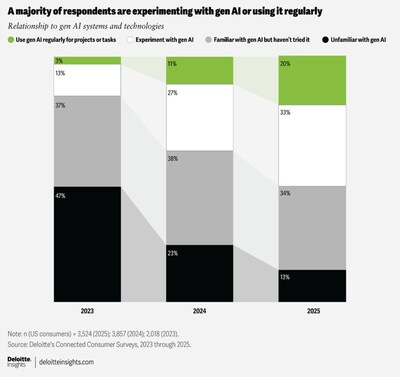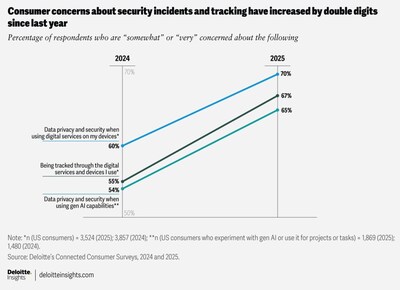Deloitte: As Generative AI Gains Ground, Consumers Choose the Innovators They Trust
Tech innovation alone isn't enough; consumers often demand privacy, clarity and ethical security from tech providers in today's AI-driven world
NEW YORK, Sept. 25, 2025 /PRNewswire/ --
Key takeaways
- GenAI goes mainstream: Over half (53%) of surveyed U.S. consumers use or experiment with GenAI, and usage at work has surged more than fivefold since 2023, rising from 6% to 34%.
- Despite rapid adoption, GenAI raises concerns: 82% of users surveyed say the technology could be misused (up from 74% in 2024).
- Privacy concerns run high: 70% of respondents worry about data privacy and security when using digital services, and only around 1 in 10 consumers say they are very willing to share certain types of sensitive information, such as financial, communication or biometric data.
- Responsible innovation can pay off: Surveyed consumers who view their tech providers as excelling in both innovation and data responsibility spend 62% more annually on tech devices compared to consumers who view their providers as lagging on both aspects. Even among companies seen as innovative, those that are also trusted see 25% higher spending annually on tech devices—proof that trust isn't just a "nice to have," it's a competitive edge.
Why this matters
For six years, the Deloitte Center for Technology, Media & Telecommunications has surveyed consumers to help understand their attitudes toward digital life. In its 2025 "Connected Consumer" survey, Deloitte examines how Generative AI (GenAI) has entered the mainstream. Forty-two percent of surveyed GenAI users say it has a "very positive" effect on their lives — outpacing perceptions of both devices (36%) and apps (29%). While enthusiasm is high for many and household tech spending continues to rise, concerns about data security and transparency are escalating for those surveyed. For tech companies, the challenge seems clear: Innovation paired with responsible practices can help to earn trust and drive growth in an AI-driven world.
Key quote
"GenAI is having an early internet-era moment — the excitement is real, and adoption is accelerating fast. It's driving massive momentum across the tech ecosystem. But as usage surges, consumer trust isn't keeping pace. Many consumers want intelligent, personalized experiences — but preferably from companies that protect their data and empower their choices. That's the new threshold for earning loyalty."
— China Widener, vice chair and technology, media and telecommunications industry leader, Deloitte
Buying habits: Digital spending stays strong
Many U.S. consumers continue to invest in their connected lifestyles — despite ongoing concerns for some about affordability — with 70% of surveyed households expected to increase their device spending or keep it steady.
- Respondents' households are spending approximately 17% more on average on connected devices this year — $896 in 2025 compared to $764 in 2024.
- Monthly household spending on digital services and subscriptions was $183 in this year's survey, slightly up from a monthly spend of $175 in 2024.
- Among regular GenAI users, about four in 10 surveyed say their households pay for GenAI-infused tools and services, while half of non-payers say that free tools meet their needs.
AI in the workplace: From experimentation to expectation
GenAI is rapidly becoming a powerful tool in the workplace, transforming how many employees work and learn. While most GenAI users report meaningful gains in efficiency, decision-making and creativity, some organizations are still playing catch-up when it comes to setting clear policies and providing the right tools.
- Among surveyed consumers who are using GenAI at work, almost half (46%) report that these tools substantially boost their productivity.
- While many say their organizations encourage use of the technology (55%) and provide training (40%), nearly seven in 10 say they use their own GenAI tools on the job—"shadow AI" — which could raise compliance and governance risks.
- Employee demand for GenAI tools is likely to rise: More than half (53%) of surveyed workers agreed they can see GenAI serving as a valuable assistant in their future roles.
Security and privacy: The trust gap widens
As GenAI becomes increasingly integrated into daily life, concerns about security and transparency are rising. Despite rapid adoption of the technology, skepticism persists: Nearly three-quarters (74%) of respondents familiar or experimenting with GenAI — and even 62% of regular users — say the increasing popularity of GenAI makes it harder for them to trust what they see online. Many respondents also worry about devices or digital accounts being hacked, data breaches, identities being stolen, and their location being tracked.
- Almost half (47%) of respondents experienced at least one kind of security failure in the past year, with over one-quarter (27%) reporting two or more. And 58% encountered at least one scam attempt in the past year, including phishing, fake profiles, chatbots impersonating real people, deepfake videos, ransomware/malware attacks, and voice cloning.
- Willingness to share sensitive data (financial, biometric, communication) remains low, with over half of respondents unwilling to share — even for better experiences.
- Eighty-two percent of surveyed GenAI users and experimenters are concerned GenAI could be misused by "bad actors."
From innovation to impact: Why trust could decide the winners
Deloitte's analysis reveals that respondents who view their tech providers as both innovative and responsible with their data spend 62% more annually on devices and 26% more per month on services compared to those who see their providers as lagging in both areas. Even among companies seen as innovative, those that also excel at data responsibility see almost four times as much trust, and 25% higher tech device spending annually — proof that data responsibility and trust aren't just a "nice to have," but a competitive edge.
- While most respondents (75%) strongly or somewhat agree that new features improve their lives, nearly as many (69%) strongly or somewhat agree that tech companies innovate too quickly without paying enough attention to mitigating risks.
- Fewer than half (48%) of respondents indicated that the benefits they get from online services outweigh their privacy concerns — a steep drop from 58% in 2024, and the lowest level since Deloitte began surveying this sentiment in 2019.
- Many surveyed consumers who expressed security concerns fear not only bad actors like hackers (71%) but also worry that tech companies themselves may not protect data adequately (64%). The majority (60%) of these respondents fear unauthorized use of their information by tech companies.
- Only 20% of survey respondents say tech providers are very clear about what data they collect, and only about one-quarter (27%) have high/very high confidence that their data is protected.
Key quote
"Trust isn't just a value — it's a powerful growth engine. While consumers are naturally drawn to innovation, they deepen their engagement and loyalty with companies that prioritize responsible data stewardship. By combining cutting-edge technology with strong data ethics, companies can do more than just lead the market, they can cultivate lasting customer relationships."
— Steve Fineberg, vice chair and U.S. technology sector leader, Deloitte
About this survey
Deloitte surveyed 3,524 U.S. consumers in Q2 2025. All data was weighted to the most recent U.S. Census to arrive at a representative view of U.S. consumers' opinions and behaviors. To gain a more detailed understanding of various consumer groups, Deloitte also segmented respondents into generational groups defined by their birth year: Generation Z (1997–2011), Millennials (1983–1996), Generation X (1966–1982), Boomers (1947–1965), and Matures (1946 and prior).
Connect with us on LinkedIn at Deloitte.
About Deloitte
Deloitte provides industry-leading audit, consulting, tax and advisory services to many of the world's most admired brands, including nearly 90% of the Fortune 500® and more than 8,500 U.S.-based private companies. At Deloitte, we strive to live our purpose of making an impact that matters for our people, clients, and communities. We bring together distinct talents, technologies, disciplines, and an ecosystem of alliances to help tackle today's most complex business challenges and drive long-term progress. Deloitte is proud to be part of the largest global professional services network serving our clients in the markets that are most important to them. Bringing 180 years of service, our network of member firms spans more than 150 countries and territories. Learn how Deloitte's approximately 460,000 people worldwide connect for impact at www.deloitte.com.
Deloitte refers to one or more of Deloitte Touche Tohmatsu Limited, a UK private company limited by guarantee ("DTTL"), its network of member firms, and their related entities. DTTL and each of its member firms are legally separate and independent entities. DTTL (also referred to as "Deloitte Global") does not provide services to clients. In the United States, Deloitte refers to one or more of the US member firms of DTTL, their related entities that operate using the "Deloitte" name in the United States and their respective affiliates. Certain services may not be available to attest clients under the rules and regulations of public accounting. Please see www.deloitte.com/about to learn more about our global network of member firms.
![]() View original content to download multimedia:https://www.prnewswire.com/news-releases/deloitte-as-generative-ai-gains-ground-consumers-choose-the-innovators-they-trust-302566480.html
View original content to download multimedia:https://www.prnewswire.com/news-releases/deloitte-as-generative-ai-gains-ground-consumers-choose-the-innovators-they-trust-302566480.html
SOURCE Deloitte




